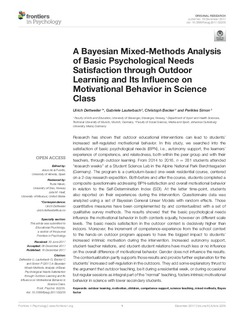A Bayesian Mixed-Methods Analysis of Basic Psychological Needs Satisfaction through Outdoor Learning and its Influence on Motivational Behavior in Science Class
Journal article, Peer reviewed
Published version
Permanent lenke
http://hdl.handle.net/11250/2491928Utgivelsesdato
2017-12Metadata
Vis full innførselSamlinger
Originalversjon
Dettweiler, U. et al. (2017) A Bayesian Mixed-Methods Analysis of Basic Psychological Needs Satisfaction through Outdoor Learning and its Influence on Motivational Behavior in Science Class. Frontiers in Psychology. 2017, 8 . 10.3389/fpsyg.2017.02235Sammendrag
Research has shown that outdoor educational interventions can lead to students' increased self-regulated motivational behavior. In this study, we searched into the satisfaction of basic psychological needs (BPN), i.e., autonomy support, the learners' experience of competence, and relatedness, both within the peer group and with their teachers, through outdoor learning. From 2014 to 2016, n = 281 students attended “research weeks” at a Student Science Lab in the Alpine National Park Berchtesgaden (Germany). The program is a curriculum-based one-week residential course, centered on a 2-day research expedition. Both before and after the course, students completed a composite questionnaire addressing BPN-satisfaction and overall motivational behavior in relation to the Self-Determination Index (SDI). At the latter time-point, students also reported on their experiences during the intervention. Questionnaire data was analyzed using a set of Bayesian General Linear Models with random effects. Those quantitative measures have been complemented by and contextualized with a set of qualitative survey methods. The results showed that the basic psychological needs influence the motivational behavior in both contexts equally, however on different scale levels. The basic needs satisfaction in the outdoor context is decisively higher than indoors. Moreover, the increment of competence-experience from the school context to the hands-on outdoor program appears to have the biggest impact to students' increased intrinsic motivation during the intervention. Increased autonomy support, student-teacher relations, and student-student relations have much less or no influence on the overall difference of motivational behavior. Gender does not influence the results. The contextualization partly supports those results and provide further explanation for the students' increased self-regulation in the outdoors. They add some explanatory thrust to the argument that outdoor teaching, be it during a residential week, or during occasional but regular sessions as integral part of the “normal” teaching, fosters intrinsic motivational behavior in science with lower secondary students.

